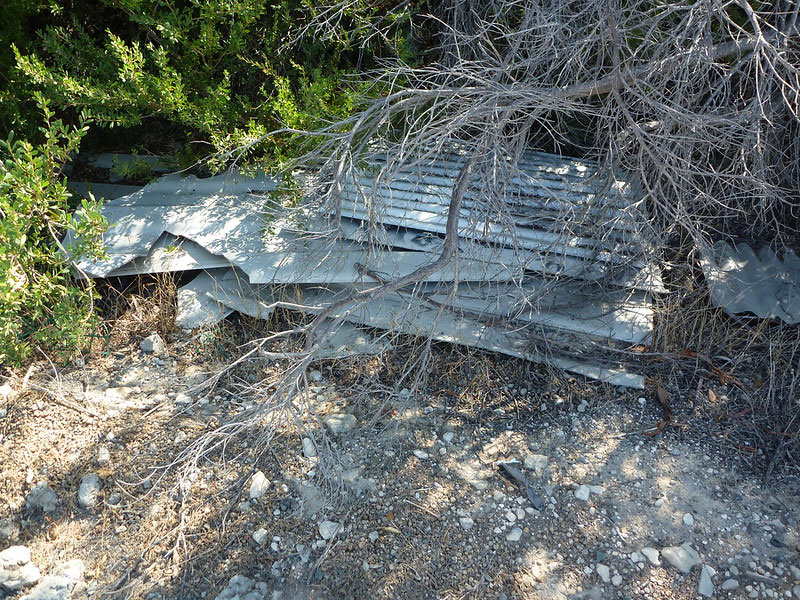How to deal with asbestos fly-tipping
While those who illegally dump rubbish in such locations as country lanes, towns and cities tend to be motivated by a wish to avoid the costs associated with legal disposal, their actions aren’t just a nuisance to the wider public and the local environment.
That’s because fly-tipping – especially asbestos fly-tipping – could also bring about a serious risk to health, in addition to leaving the fly-tipper open to major legal ramifications.

Photo by Sam Wilson
What are the dangers of fly-tipping – including of asbestos?
There are many items or materials that could – and sadly often are – dumped off the back of a truck or another vehicle in locations where it is illegal to do so, ranging from furniture and mattresses to fridge-freezers and building materials. Indeed, as you are probably aware, one material that was used widely in construction in the UK until its use was finally fully banned in 1999, was asbestos.
Although the fibrous silicate material known as asbestos is naturally occurring, it was found over time to pose potentially serious risks to human health. Indeed, despite asbestos not having been used for more than two decades as of 2022, there continues to be about 5,000 deaths a year in the UK that are attributable to asbestos-related disease.
How could that be the case? Well, there is known to be a long latency period between when someone first inhales or ingests asbestos, and when the first symptoms of asbestos-related disease can occur – as long as 50 or 60 years in some cases.
Plus, although asbestos is no longer actively used in construction in the UK, the material remains present in many public, commercial, and domestic buildings across the country. This means there can still be scope for new instances of asbestos exposure to occur.
As the Health and Safety Executive (HSE) has outlined, asbestos is not believed to pose a risk to health if it is in good condition and undisturbed.
If, however, asbestos is damaged or disturbed – and fly-tipping is a classic example of when this can happen – the substance’s microscopic fibres can be released into the air, and subsequently breathed in by someone nearby. This can eventually lead to the development of potentially fatal asbestos-related disease.
Where is asbestos fly-tipping likely to occur?
The fly-tipping of asbestos can, of course, theoretically occur anywhere; however, it is unfortunately all too common for asbestos-containing materials (ACMs) to be dumped in areas close to where children play, such as in rural areas, parks, or near school playing fields.
It has also been known in the past for ACMs to be illegally dumped along the sides of roads, on footpaths, tracks, and country lanes.
If you see a mysterious substance left behind in locations like the above, and it looks like a quantity of material that would fit in a small commercial van or car boot, this could be a particular clue that it has been illegally dumped, and that the material might be asbestos.
Who is liable if illegal asbestos dumping is discovered?
Here’s one more strong reason why people need to be extremely vigilant against the risk of illegally dumped asbestos: if fly-tipped asbestos waste can be traced back to the owner of a building or home, that person is liable for prosecution, even if they weren’t the ones who dumped the material.
A common scenario here is that of someone who tries to ‘do the right thing’ by entrusting the removal of their waste to a dedicated company, only for that company to turn out to be… less than responsible in how they dispose of the waste.
This underlines how crucial it is, if you are considering using an asbestos removal company to remove ACMs from your commercial or residential premises, to undertake the necessary due diligence. This should include checking that the company you’re thinking of using holds a waste transfer licence and has a good all-round reputation.
What are the penalties for disposing of hazardous waste illegally?
Those who are convicted of offences in relation to the illegal disposal of waste can be fined an unlimited amount. The Magistrate is also able to imprison someone for up to 12 months for asbestos fly-tipping. The most serious cases can be referred to the Crown Court, which can lead to a prison sentence of up to five years for those found guilty.
What should you do if you discover illegally dumped asbestos waste?
If you discover what you believe to be illegally dumped asbestos waste, you must avoid disturbing it, given the risk this could bring of further asbestos fibres being released into the air, with the associated health risks.
Instead, if it is a relatively small quantity of asbestos that has been dumped, and presuming you are in England or Wales, you are advised to report it to your local council. If the illegal dumping is of a larger scale and/or involves hazardous waste such as asbestos, the UK Government advises contacting Crimestoppers.
What if you see the fly-tipping itself take place? In that case, it is essential that you call the police and report the incident. You can expect to be asked to provide details like the registration number of the vehicle that the material has been dumped from, as well as a description of the vehicle and the driver and passengers.
Contact Oracle Solutions for any of a wide range of asbestos services
If you are operating in a commercial capacity and require an accredited asbestos management service such as the sampling, surveying, or removal of this highly dangerous material, please do not hesitate to place your trust in Oracle Solutions.
Call 0844 244 7326 or send us an email to request your fast, free, and competitive asbestos quote.
